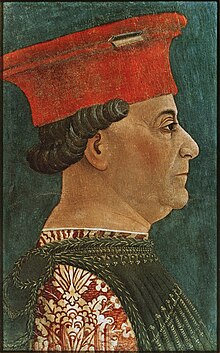Francisco Sforza
| Francesco I Sforza | |
|---|---|
| Lord of Ancona | |

Portrait of Francesco Sforza (c. 1460) by Bonifacio Bembo. Sforza insisted on being shown in his worn dirty old campaigning hat. Pinacoteca di Brera, Milan
|
|
| Duke of Milan | |
| Reign | 25 March 1450 – 8 March 1466 |
| Predecessor | Filippo Maria Visconti |
| Successor | Galeazzo Maria Sforza |
| Spouse(s) |
Polissena Ruffo Bianca Maria Visconti |
|
Issue
Galeazzo Maria Sforza Duke of Milan
Ippolita Maria Sforza Duchess of Calabria Filippo Maria Sforza, Count of Corsica Sforza Maria Sforza, Duke of Bari Francesco Galeazzo Maria Sforza Ludovico Sforza Duke of Milan Ascanio Maria Sforza Elisabetta Maria Sforza, Margravine of Montferrato Ottaviano Maria Sforza, Count of Lugano |
|
| Noble family | House of Sforza |
| Father | Muzio Sforza |
| Mother | Lucia da Torsano |
| Born |
23 July 1401 San Miniato |
| Died | 8 March 1466 (aged 64) Milano |
Francesco I Sforza (Italian pronunciation: [franˌtʃesko ˌpriːmo ˈsfɔrtsa]; 23 July 1401 – 8 March 1466) was an Italian condottiero, the founder of the Sforza dynasty in Milan, Italy, and was the fourth Duke of Milan from 1450 until his death. He was the brother of Alessandro, whom he often fought alongside.
Francesco Sforza was born in San Miniato, Tuscany, one of the seven illegitimate sons of the condottiero Muzio Sforza and Lucia da Torsano. He spent his childhood in Tricarico (in the modern Basilicata), the marquisate of which he was granted in 1412 by King Ladislaus of Naples. In 1418, he married Polissena Ruffo, a Calabrese noblewoman.
From 1419, he fought alongside his father, soon gaining fame for being able to bend metal bars with his bare hands. He later proved himself to be an expert tactician and very skilled field commander. After the death of his father during the War of L'Aquila, he participated in the Braccio da Montone's final defeat in that campaign; he fought subsequently for the Neapolitan army and then for Pope Martin V and the Duke of Milan, Filippo Maria Visconti. After some successes, he fell in disgrace and was sent to the castle of Mortara as a prisoner de facto. He regained his status after leading an expedition against Lucca.
...
Wikipedia
